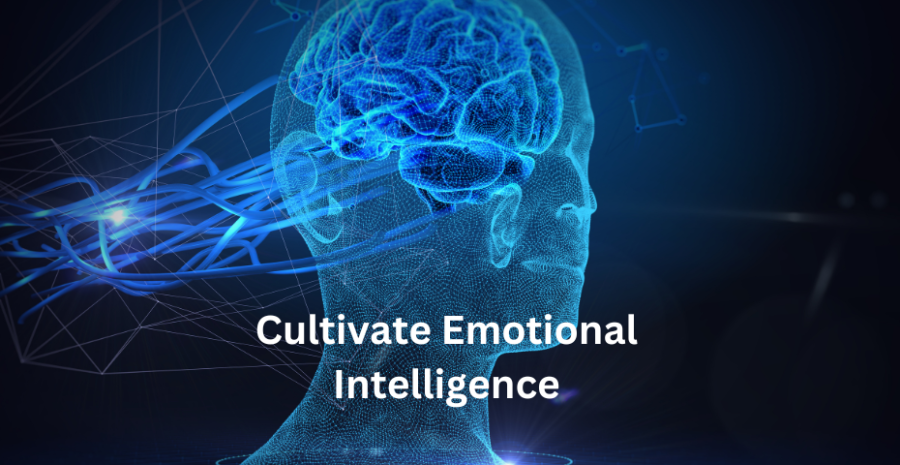

Starting and running a business requires more than just innovative ideas and hard work; it demands a strong mental framework. One of the most critical aspects of this mental framework is learning not to believe everything you think.
Here are ten insights on why this mindset is crucial for entrepreneurs.

As an entrepreneur, you generate countless thoughts daily. However, it's essential to recognize that not all of these thoughts are accurate. Cognitive biases, emotions, and stress can cloud your judgment, leading to decisions based on incorrect assumptions. Train yourself to question your thoughts and seek evidence before acting on them.
As an entrepreneur, the mind is your most powerful tool, yet it can also be a deceptive one. It's common to equate our thoughts with reality, but in truth, our thoughts are just interpretations of the world around us. They are influenced by our experiences, emotions, and biases, which can lead to misjudgments and errors in decision-making. Recognizing that your thoughts aren't always facts is the first step towards developing a more objective and effective mindset.
Imagine a scenario where you're pitching your business idea to potential investors. You might think, "They won't be interested; my idea isn't good enough." This thought can feel overwhelmingly real, leading you to doubt your presentation. However, this is merely a projection of your insecurities, not an objective truth. Challenging this thought by seeking feedback and focusing on the strengths of your proposal can alter your perception and boost your confidence.
Entrepreneurial stress often exacerbates negative thinking. During high-pressure situations, such as meeting tight deadlines or dealing with financial setbacks, it's easy to succumb to thoughts like, "I'm going to fail" or "This is too much for me." While these thoughts reflect your stress, they are not factual assessments of your capabilities. Taking a step back to evaluate the situation rationally can help you see that there are always solutions and opportunities for improvement.
Cognitive biases, like the negativity bias, further distort our thinking. The negativity bias makes us more likely to focus on and remember negative experiences over positive ones. For example, a single piece of negative feedback might overshadow multiple positive reviews, leading you to believe your product is flawed. By recognizing this bias, you can consciously balance your perspective and make more balanced, fact-based decisions.
Emotional states heavily influence our thoughts, often leading to irrational conclusions. On a bad day, minor setbacks can feel like insurmountable obstacles, while on a good day, the same setbacks might seem trivial. Understanding that your emotional state colors your perception can help you avoid making hasty decisions based on temporary feelings. It’s crucial to wait until you’re in a calmer, more balanced state before making significant choices.
Self-doubt is a common issue among entrepreneurs, fueled by the "impostor syndrome"—the belief that you’re not as competent as others perceive you to be. Thoughts like "I'm not cut out for this" or "I just got lucky" can undermine your confidence. These thoughts are often unfounded and ignore your skills, hard work, and achievements. Acknowledging your successes and abilities can help counteract these detrimental thoughts.
Groupthink is another pitfall where your thoughts can mislead you. When surrounded by a team or community with a unanimous opinion, you might feel pressured to conform, even if you have reservations. This can lead to poor business decisions. Encouraging diverse viewpoints and fostering an environment where questioning and debate are welcomed can help ensure that decisions are well-rounded and thought through.
Market trends and competitor actions often influence your thoughts, sometimes to an unhealthy extent. You might think, "We need to follow this trend or we’ll fall behind." However, not all trends are beneficial for your specific business model. Analyzing market data and aligning trends with your long-term strategy is crucial, rather than blindly following what others are doing.
Entrepreneurs often face the challenge of overthinking, where excessive analysis leads to paralysis. You might think, "I need to consider every possible outcome before making a move." While planning is important, overthinking can prevent timely action and stifle innovation. Trusting your instincts and accepting that not every decision will be perfect can propel you forward.
Finally, it’s important to differentiate between intuition and impulsive thoughts. Intuition, developed through experience, can be a valuable guide. However, impulsive thoughts, driven by fear or excitement, often lack the necessary foundation in reality. Learning to discern between the two through reflective practice and feedback can enhance your decision-making process.
Confirmation bias is the tendency to favor information that confirms your preexisting beliefs. This can be particularly dangerous for entrepreneurs, leading to poor decisions based on incomplete data. Counteract this bias by actively seeking out and considering opposing viewpoints and challenging your assumptions.
Confirmation bias, the tendency to favor information that confirms our preexisting beliefs while ignoring or dismissing contradictory evidence, is a significant cognitive pitfall for entrepreneurs. This bias can lead to flawed decision-making processes, as it restricts your perspective and prevents you from considering all relevant data. Being aware of and actively countering confirmation bias can help you make more balanced and informed business decisions.
When launching a new product, you might focus only on positive feedback from initial tests and ignore any negative responses. This selective attention can skew your perception of the product’s viability. To combat this, actively seek out and analyze all feedback, both positive and negative. This comprehensive approach ensures you address potential issues before a full-scale launch, ultimately improving the product's success rate.
Confirmation bias often surfaces during market research. You might subconsciously search for data that supports your market entry strategy, overlooking signs that suggest potential risks or challenges. Conducting thorough, unbiased research, possibly by involving third-party analysts, can provide a more accurate market picture. Diverse sources and perspectives help you understand the market dynamics better and make more strategic decisions.
Team dynamics can also be affected by confirmation bias. As a leader, you might prefer input from team members who consistently agree with you, reinforcing your ideas and plans. This can stifle innovation and critical thinking within your team. Encouraging a culture of open dialogue and dissent, where team members feel safe to voice differing opinions, can lead to more robust and creative solutions.
Investor relations are another area where confirmation bias can be detrimental. If you're only presenting data that shows your company in a favorable light, you might miss out on valuable feedback that could address underlying issues. Transparent communication with investors, including both successes and challenges, builds trust and allows for more meaningful support and guidance.
In strategic planning, confirmation bias can lead to sticking with a failing strategy longer than necessary because you focus on selective positive signs of progress. Regularly reviewing and challenging your strategic assumptions with your team can help identify when a pivot or adjustment is necessary. This practice ensures that your strategy remains aligned with the evolving business environment.
Hiring decisions are also susceptible to confirmation bias. You might favor candidates who share your viewpoints, which can lead to a homogenous team lacking diversity of thought. Implementing structured and objective hiring processes that evaluate candidates on a broad set of criteria can help build a more diverse and innovative team. This diversity can drive better decision-making and creativity.
Customer feedback is crucial for continuous improvement, but confirmation bias can lead you to dismiss critical feedback as outliers. Instead, systematically analyze all customer feedback and look for patterns. Understanding and addressing recurring issues can enhance customer satisfaction and loyalty, leading to long-term business success.
Your marketing strategy can suffer from confirmation bias if you only focus on metrics that indicate success, such as high engagement rates, while ignoring low conversion rates. A balanced approach to analyzing marketing data, considering both strengths and weaknesses, allows you to optimize your campaigns effectively. This comprehensive analysis helps in identifying areas for improvement and scaling successful tactics.
Innovation requires breaking free from confirmation bias. Sticking with familiar and proven ideas because they align with your existing beliefs can stifle innovation. Encourage a culture of experimentation and be willing to explore new concepts, even if they challenge your current thinking. This openness can lead to breakthroughs and keep your business ahead of the competition.
Finally, personal growth as an entrepreneur demands vigilance against confirmation bias. Acknowledging that you don't have all the answers and being open to continuous learning and self-improvement is essential. Seek feedback from mentors, peers, and even competitors, and be willing to adapt your views based on new information. This humility and adaptability can significantly enhance your leadership and decision-making capabilities.
In conclusion, avoiding confirmation bias is crucial for sound decision-making in entrepreneurship. By actively seeking diverse perspectives, encouraging open dialogue, and being willing to challenge your own assumptions, you can make more informed and effective business decisions. This approach not only fosters innovation and growth but also builds a resilient and adaptable business foundation.

Constructive criticism is invaluable for growth. It’s easy to fall into the trap of dismissing feedback that contradicts your beliefs. Instead, view criticism as an opportunity to improve. Seek input from mentors, peers, and employees, and use it to refine your strategies and operations.
Constructive criticism is a vital tool for entrepreneurial growth and development. It provides valuable insights into areas that need improvement, helping you refine your strategies and operations. By embracing constructive criticism, you open yourself to learning opportunities that can drive innovation and efficiency within your business. Rather than viewing feedback as a personal attack, see it as a chance to gain new perspectives and enhance your skills.
Encouraging an environment where team members feel comfortable offering and receiving constructive criticism fosters a culture of continuous improvement. This openness can lead to more robust problem-solving and better decision-making processes, as diverse viewpoints are considered. Constructive criticism also helps you identify blind spots that you might not have noticed otherwise, ensuring that your business is well-rounded and prepared for various challenges.
It's crucial to actively seek out constructive criticism from trusted sources, such as mentors, peers, and customers. Regularly requesting feedback demonstrates your commitment to growth and shows that you value others' opinions. This practice not only helps you improve but also builds stronger relationships based on mutual respect and trust. Implementing changes based on constructive criticism can lead to increased customer satisfaction, higher employee morale, and ultimately, better business performance.
Furthermore, learning to handle constructive criticism with grace and a positive attitude sets a powerful example for your team. It shows that you are committed to personal and professional growth, and it encourages others to adopt a similar mindset. By normalizing the process of giving and receiving feedback, you create a supportive environment where everyone is focused on achieving their best. Embracing constructive criticism is not just about accepting feedback; it's about actively using it to drive your entrepreneurial journey forward.
Your ego can distort your perception of reality, making you overconfident or overly defensive. Make decisions based on objective analysis and facts rather than personal pride or fear of admitting mistakes. This approach fosters better decision-making and resilience in the face of setbacks.
As an entrepreneur, separating your ego from decision-making is crucial for objective and effective choices. Ego-driven decisions often stem from a desire to protect your self-image or prove yourself right, which can cloud your judgment and lead to poor outcomes. By setting aside your ego, you can evaluate situations more objectively, considering all available data and diverse perspectives rather than just those that align with your preconceptions.
A decision-making process free from ego encourages humility and openness to new ideas, fostering innovation and adaptability. When you prioritize the best interests of your business over personal pride, you're more likely to seek and value input from others, including employees, advisors, and stakeholders. This collaborative approach can lead to more comprehensive and well-rounded solutions to challenges.
Separating ego from decision-making also helps you admit and learn from mistakes, which is essential for growth. Acknowledging errors without defensiveness allows you to address issues promptly and effectively, preventing small problems from escalating into significant setbacks. This humility can enhance your leadership credibility and build trust within your team.
Moreover, making decisions based on objective criteria rather than ego can improve your strategic thinking. It allows you to focus on long-term goals and sustainable success rather than short-term wins that might satisfy your ego but harm your business in the long run. By keeping your ego in check, you pave the way for more rational, thoughtful, and ultimately successful entrepreneurial decisions.

Stress and fatigue significantly affect cognitive function, often leading to negative or irrational thoughts. Recognize when you’re under strain and give yourself permission to rest. Regular breaks, exercise, and mindfulness practices can help maintain a clear, rational mindset.
Stress and fatigue are formidable challenges that can significantly impair an entrepreneur's cognitive functions and decision-making abilities. Under high stress, the body and mind react in ways that can cloud judgment, reduce creativity, and lead to impulsive or poorly thought-out decisions. Recognizing the impact of stress and fatigue is essential for maintaining clarity and effectiveness in your business operations.
When you're fatigued, your ability to process information accurately diminishes, and you become more prone to errors and oversights. Chronic stress exacerbates this by triggering a fight-or-flight response, which narrows your focus to immediate threats at the expense of long-term planning and strategic thinking. This can cause you to miss important opportunities or misjudge risks.
It's crucial to implement stress management techniques, such as regular exercise, mindfulness practices, and adequate rest, to maintain optimal cognitive function. Taking breaks and ensuring you have downtime helps to recharge your mind and body, improving your decision-making capabilities. Prioritizing self-care isn't just beneficial for your health; it's a strategic move that enhances your ability to lead effectively.
Furthermore, fostering a supportive work environment can mitigate the impact of stress on you and your team. Encouraging open communication, delegating tasks, and providing resources for stress management can create a more resilient and productive workforce. By understanding and addressing the effects of stress and fatigue, you ensure that both you and your team are operating at your best, leading to better business outcomes.
A growth mindset is the belief that abilities and intelligence can be developed with effort and persistence. This mindset encourages learning and resilience, essential traits for any entrepreneur. When you encounter setbacks, view them as learning opportunities rather than failures.
Cultivating a growth mindset is essential for entrepreneurs aiming to navigate the dynamic business landscape successfully. A growth mindset, the belief that abilities and intelligence can be developed through effort and learning, fosters resilience and adaptability. This perspective encourages you to view challenges and setbacks as opportunities for growth rather than insurmountable obstacles.
With a growth mindset, you are more likely to embrace continuous learning and seek out new skills and knowledge, which can drive innovation and keep your business competitive. It allows you to persist in the face of difficulties, viewing failures not as reflections of your inadequacy but as valuable learning experiences that contribute to your long-term success. This mindset shift can significantly enhance your problem-solving capabilities and creativity.
Additionally, a growth mindset promotes a culture of collaboration and improvement within your team. When employees see that you value effort and learning, they are more motivated to push their boundaries and contribute to the company’s growth. This approach leads to a more dynamic, forward-thinking organization where everyone is invested in continuous development.
Implementing practices such as regular feedback, goal setting, and celebrating small achievements can reinforce a growth mindset. By focusing on progress rather than perfection, you create an environment where experimentation and calculated risks are encouraged. Developing a growth mindset not only empowers you to achieve your entrepreneurial goals but also fosters a thriving, innovative business culture.

Relying solely on intuition can be risky. Use data and analytics to inform your decisions, ensuring they are based on concrete evidence rather than gut feelings. This approach not only improves accuracy but also provides a clear rationale for your actions, which can be vital when communicating with stakeholders.
Leveraging data to drive decisions is crucial for making informed and effective choices in entrepreneurship. Data provides objective insights that can validate or challenge your assumptions, ensuring that your strategies are based on factual evidence rather than intuition or guesswork. By analyzing relevant metrics and trends, you can identify patterns and make predictions that guide your business direction more accurately.
Data-driven decision-making helps you optimize operations by highlighting areas for improvement and revealing opportunities for growth. For instance, customer behavior data can inform your marketing strategies, product development, and customer service enhancements. This targeted approach not only improves efficiency but also enhances customer satisfaction and retention.
Furthermore, using data to drive decisions mitigates risks by providing a clearer picture of potential outcomes. You can model different scenarios and assess their impacts, allowing for better risk management and contingency planning. This proactive approach enables you to navigate uncertainties with greater confidence and preparedness.
Adopting a data-driven culture within your organization encourages a mindset of continuous learning and improvement. It empowers your team to base their actions on evidence, fostering accountability and transparency. By regularly reviewing and acting on data insights, you ensure that your business remains agile and responsive to changes in the market, ultimately leading to sustained success and competitive advantage.
The business landscape is constantly changing, and rigid thinking can be a significant hindrance. Stay open to new information and be willing to pivot your strategies when necessary. Flexibility allows you to respond to market shifts and new opportunities more effectively.
Staying agile and adaptable is essential for entrepreneurs navigating the ever-changing business landscape. Agility allows you to swiftly respond to market shifts, emerging trends, and unforeseen challenges, ensuring your business remains relevant and competitive. By fostering adaptability, you can pivot strategies, innovate solutions, and seize new opportunities as they arise, turning potential setbacks into avenues for growth.
An agile mindset encourages a culture of experimentation and flexibility within your organization. Instead of rigidly adhering to a fixed plan, you can test new ideas, learn from outcomes, and iterate quickly based on feedback and data. This approach not only speeds up innovation but also reduces the risks associated with large-scale, untested changes.
Being adaptable means embracing continuous learning and being open to change. It involves staying informed about industry developments, seeking diverse perspectives, and being willing to revise your strategies. This readiness to adapt ensures that your business can evolve with the market, rather than being left behind by stagnation.
Moreover, agility and adaptability enhance team resilience. When your team is equipped to handle change and uncertainty, they are more likely to stay motivated and perform effectively under pressure. Encouraging a flexible and responsive work environment fosters collaboration and creativity, driving sustained success and enabling your business to thrive in a dynamic market.

Emotional intelligence (EI) is the ability to recognize and manage your own emotions and understand the emotions of others. High EI helps you navigate interpersonal relationships, manage stress, and make thoughtful decisions. It also fosters a positive work environment, which can enhance team performance and morale.
Cultivating emotional intelligence (EI) is a vital component of entrepreneurial success, encompassing the ability to understand and manage your own emotions while effectively navigating the emotions of others. High EI allows you to maintain composure under pressure, make thoughtful decisions, and foster strong interpersonal relationships, which are crucial for leading a business. By developing self-awareness, you can better recognize your emotional triggers and responses, enabling you to approach challenges with a clear, rational mindset.
Emotional intelligence also enhances your ability to empathize with employees, customers, and stakeholders. Understanding their perspectives and emotions builds trust and rapport, facilitating more effective communication and collaboration. This empathy helps in resolving conflicts amicably and ensuring that your team feels valued and supported, which can significantly boost morale and productivity.
Furthermore, EI contributes to better leadership by enabling you to inspire and motivate your team. Leaders with high emotional intelligence can adapt their management style to meet the needs of different individuals and situations, fostering a more inclusive and dynamic work environment. By modeling emotionally intelligent behavior, you set a standard for your team, encouraging them to develop their own EI skills.
Incorporating emotional intelligence into your business practices can lead to improved decision-making, as it allows you to balance logic and intuition. This balanced approach helps in considering both the factual and human aspects of business scenarios, leading to more holistic and sustainable outcomes. Cultivating emotional intelligence not only enhances your leadership effectiveness but also contributes to the overall health and success of your business.
Regular self-reflection helps you become aware of your thought patterns and biases. Set aside time to evaluate your decisions, consider what worked and what didn’t, and identify areas for improvement. Continuous learning, through reading, courses, or networking, keeps you informed and prepared to tackle new challenges.
Investing in self-reflection and continuous learning is a cornerstone of entrepreneurial growth and development. Regular self-reflection allows you to assess your strengths, weaknesses, and areas for improvement, fostering personal and professional growth. By taking the time to analyze your experiences and decisions, you can extract valuable lessons that inform future actions and strategies. Moreover, self-reflection cultivates mindfulness and self-awareness, enabling you to navigate challenges with clarity and resilience.
Continuous learning keeps you informed about industry trends, best practices, and emerging technologies, ensuring that your knowledge remains relevant and up-to-date. Whether through formal education, workshops, or networking opportunities, embracing lifelong learning fosters innovation and adaptability, essential qualities for entrepreneurial success. Additionally, exposing yourself to diverse perspectives and experiences broadens your understanding and enhances your problem-solving capabilities.
Moreover, investing in self-reflection and continuous learning sets a positive example for your team, fostering a culture of growth and curiosity within your organization. Encouraging employees to engage in self-assessment and pursue learning opportunities not only improves individual performance but also strengthens the collective capabilities of your team. By prioritizing self-reflection and continuous learning, you demonstrate a commitment to excellence and innovation, driving sustained success in your entrepreneurial endeavors.
Entrepreneurship is as much a mental journey as it is a business venture. By not believing everything you think, you can overcome cognitive biases, make more informed decisions, and cultivate a resilient, adaptive mindset. Embrace critical thinking, seek diverse perspectives, and continuously learn and grow.
This approach not only enhances your entrepreneurial success but also fosters personal development and fulfillment.
Adopting the principle of not believing everything you think is crucial for entrepreneurial success. By recognizing that your thoughts are not always facts, you can challenge cognitive biases, embrace constructive criticism, and make data-driven decisions. Separating your ego from decision-making, managing stress and fatigue, and fostering a growth mindset enable you to stay agile and adaptable in a dynamic market. Cultivating emotional intelligence and investing in self-reflection and continuous learning further enhance your leadership capabilities and resilience. These ten key insights collectively contribute to a balanced, thoughtful approach to entrepreneurship, ensuring that you remain open to learning, adaptable to change, and committed to making informed, objective decisions.
This mindset not only drives personal growth but also paves the way for sustained business success.
(7).jpg)
About: Andries vanTonder (65)
45 years selfemployed
He is a Serial Entrepreneur, an Enthusiastic supporter of Blockchain Technology and a Cryptocurrency Investor.
Connect with me: Markethive Profile Page | My Twitter Account | My Instagram Acount | and my Facebook Profile.
